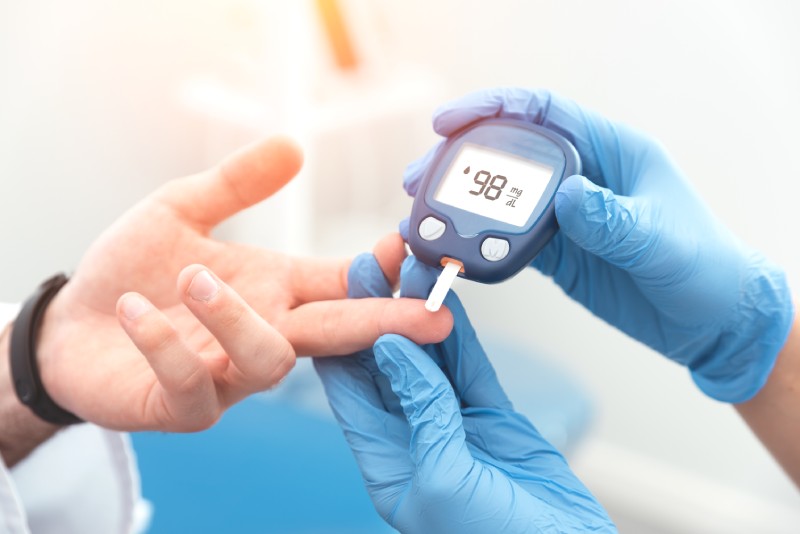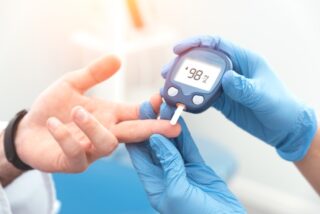Diabetes Mellitus

Diabetes mellitus, commonly known as diabetes, is a chronic condition that interferes with the way the body processes glucose (sugar). Glucose is the primary source of energy for the body’s cells. Insulin, a hormone produced by the pancreas, helps the cells metabolize glucose and turn it into energy.
In people with diabetes, the body either does not produce enough insulin or does not properly use the insulin it generates. That, in turn, leads to elevated blood sugar levels, which can have serious health consequences if left untreated.
In this article, we’ll delve deeper into the types, symptoms, and treatment options of diabetes.
Types of Diabetes

There are two main types of diabetes: Type 1 and Type 2.
Type 1 Diabetes
Type 1 diabetes is an autoimmune disorder that causes the body’s immune system to attack and kill insulin-producing beta cells in the pancreas. That makes it crucial for people with type 1 diabetes to take daily insulin injections to manage their blood sugar levels. Type 1 diabetes usually develops in children and young adults, although it can occur at any age. The condition is also known as insulin-dependent diabetes.
Type 2 Diabetes
Type 2 diabetes is the most common form of diabetes, accounting for about 90-95% of all cases. It occurs when the body does not produce enough insulin or use it properly, a condition known as insulin resistance. Over time, the pancreas may stop producing enough insulin to keep up with the body’s needs. Type 2 diabetes is often associated with obesity and is more common in older adults (above 40 years). However, it can also develop in younger people.
Besides Type 1 and Type 2 diabetes, patients can also develop the following:
Prediabetes: This condition is characterized by blood glucose levels that are higher than normal but not high enough to be classified as diabetic. It increases an individual’s risk of developing Type 2 diabetes in the future. However, it is possible to reverse prediabetes with proper lifestyle modifications.
Gestational diabetes: This is a type of diabetes that many women develop during pregnancy. It is caused by hormones produced by the placenta that affect the body’s ability to process glucose. While gestational diabetes is reversible, it increases the risk of developing type 2 diabetes.
Risk Factors of Diabetes
There are several factors that can increase a person’s risk of developing diabetes. These include:
- Being overweight or obese
- Having a family history of diabetes
- Leading a sedentary lifestyle
- Having high blood pressure
- Having high cholesterol levels
- Having a history of gestational diabetes (diabetes during pregnancy)
- Being of certain racial or ethnic backgrounds (such as African American, Hispanic/Latino, Native American, or Asian American)
- Smoking and alcohol consumption
- Increased stress
- Injury to the pancreas (accident, surgery, or tumor)
Common Symptoms of Diabetes
It is important to note that many people with diabetes do not have any symptoms, especially in the early stages of the disease. Getting regular check-ups and screenings is essential to catch the condition early.
Additionally, you should watch out for the following symptoms:
- Frequent urination
- Extreme thirst
- Hunger, even after eating
- Dry mouth and throat
- Dry or itchy skin
- Fatigue
- Blurred vision
- Slow-healing cuts or sores
- Frequent infections (particularly yeast infections and UTIs in women)
Complications of Diabetes Mellitus
Untreated or poorly managed diabetes can lead to serious health complications, such as:
- Heart disease: Diabetes mellitus and heart disease have a direct correlation. People with diabetes are at an increased risk of developing cardiovascular diseases, including heart attack and stroke.
- Kidney damage: Diabetes can damage the blood vessels in the kidneys, leading to kidney disease (also known as diabetic nephropathy).
- Nerve damage: High blood sugar levels can damage the nerves throughout the body, a condition known as diabetic neuropathy. It can cause numbness and tingling in the hands and feet. Also, it can lead to problems with digestion, bladder control, and sexual function.
- Vision problems: Diabetes can cause damage to the blood vessels in the eyes, leading to vision loss and even blindness. The condition is known as diabetic retinopathy.
Diagnosis and Treatment
Diabetes is typically diagnosed through a blood test called a hemoglobin A1C test. It measures a person’s average blood sugar levels over the past two to three months. Other tests, such as fasting blood sugar or glucose tolerance tests, may also be used to diagnose diabetes.
Treatment for diabetes involves taking steps to manage blood sugar levels, such as:
- Taking insulin or other medications as prescribed
- Eating a healthy and balanced diet
- Getting regular physical activity
- Monitoring blood sugar levels regularly
- Managing stress and getting enough sleep
- Avoiding smoking and alcohol consumption
Conclusion
Diabetes is a serious chronic condition that requires ongoing management to prevent complications. However, with proper treatment and self-management, people with diabetes can lead healthy, active lives. If you have any of the risk factors for diabetes or are experiencing any of the common symptoms, speak with a diabetes mellitus specialist to get a proper diagnosis and treatment plan.

